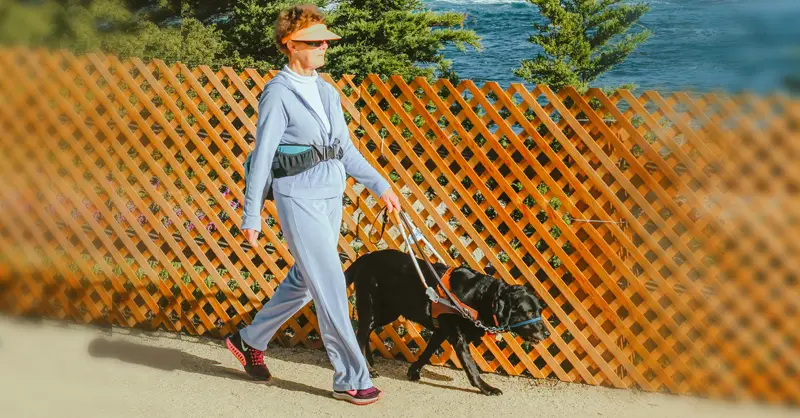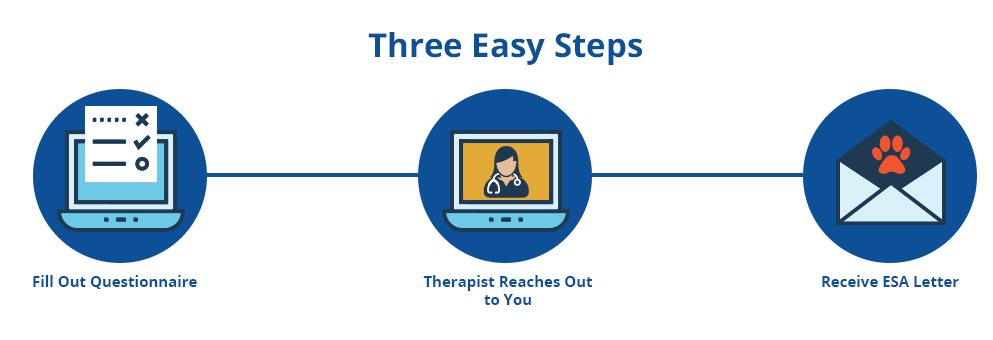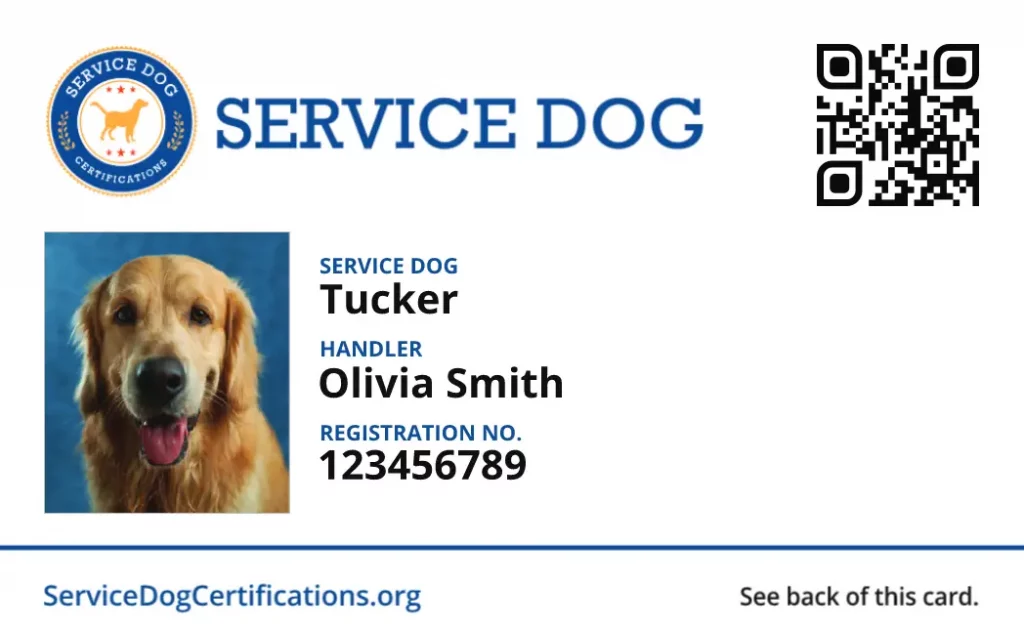Home Page › Blog › California Service Dog Requirements
California Service Dog Requirements

California allows people with disabilities to live, travel, and go about their daily lives in the presence of a service dog. Service dogs are afforded certain rights in the State of California that allow them to access public spaces that normally don’t allow pets.
Californians are protected by both federal and state laws, including under the Americans with Disabilities Act (ADA) as well as California’s Unruh Act (Civil Code, sections 51–51.2) and Disabled Persons Act (Civil Code, sections 54–55.32).
Read on for more information on California Service Dog requirements and regulations.
Definition of a service dog
Service Dog: Any canine trained to perform a disability-specific task for a person with a physical or psychiatric disability.
Service dogs used for mental health conditions are known as Psychiatric Service Dogs.
What is a disability: For legal purposes, disability is defined as a physical or mental impairment that substantially limits a major life activity (such as the ability to work, socialize, or attend school). Physical disabilities include health issues like limited mobility, visual impairment, seizures, and hearing loss. Qualifying psychiatric conditions include debilitating depression, chronic anxiety, PTSD, autism, and learning disabilities, among others.
How is a service dog trained?
To be considered a service animal, a dog must be individually trained to perform a job or task-specific to the handler’s disability.
Federal vs California rules: One difference between California’s rules and the ADA is that service dogs in training are not covered under the ADA. However, under the California Disabled Persons Act, individuals who train service dogs can bring their animals to any public place in order to train the dog and provide a disability-related service.
Who can train a dog: Dogs can be trained by the person with the disability, by a professional trainer, or with the help of a training organization. Note that in California, it is perfectly acceptable for a handler to train a service dog on their own.
Identification requirements for service dogs in California
Visible identification: Most service dog owners use service dog paraphernalia like ID cards, vests, tags, and certificates to signal to others in public that their dog is special. It is not mandatory either under California or federal rules to have an identification card or vest on your Service Dog, but handlers frequently use them for personal convenience. These items can prevent intrusive inquiries and unwanted interaction with the service animal while on duty.
Disability verification: Staff at venues and landlords cannot demand documentation as a condition of entry. In California, they can ask two questions to validate whether you have a service dog (and only if the disability is not obvious):
1. Is the animal a service dog required for a disability?
2. What work or task has the service dog been trained to perform?
Service dog registration in California
California does not require the registration of service dogs. There may be registration requirements that generally apply to all dogs that reside in your area, but they are not service-dog specific. Service dog owners, however, choose to voluntarily register their dogs for several reasons.
What it’s for: Registering a service dog with a service like Service Dog Certifications enters the dog’s information into a searchable database linked to an ID card. The ID card can be used as one way to signal to others that you own a service dog or be presented when third parties unaware of service dog verification rules continually insist on seeing documentation.
Psychiatric service dog requirements
Psychiatric service dogs are recognized as service dogs in California with all the same rights and benefits of ownership.
Psychiatric service dogs are still not well appreciated by the general public but are a growing category of assistance animals.
California considers the following as psychiatric disabilities if they substantially limit a major life activity:
- Post-Traumatic Stress Disorder
- Anxiety Disorders
- Depression
- Obsessive-Compulsive Disorders
- Personality Disorders
- Schizophrenia and Schizoaffective Disorder
- ADHD
- Autism
Psychiatric service dogs can perform an amazing number of tasks, including:
- Deep pressure therapy
- Reminding the owner to take medication
- Posting and watching the owner’s back in open areas
- Tactile stimulation
- Alerting the owner to oncoming threats or episodes
- Disrupting repetitive self-destructive behaviors
Service dog vs emotional support dog in California
California also recognizes emotional support animals as a type of assistance animal. An emotional support animal (ESA) alleviates symptoms of a mental or emotional health condition.
SD vs ESA: There are major differences between ESAs and service dogs.
- ESAs do not require any specialized training.
- ESAs are protected under the Fair Housing Act, not the ADA, so the benefits extend primarily to housing rights and do not come with public access rights.
- While service dogs can only be dogs, ESAs can be dogs, cats, birds, gerbils, fish, turtles, and other small household pets.
To qualify for an emotional support animal in California, you need an ESA letter from a California-licensed mental health professional. See if you qualify for an emotional support animal letter by completing the online questionnaire below.

You and your service dog in California
Service Dog handlers in California have generous rights. These include:
- Public access (venues, outdoor areas, etc.)
- Access to public transportation
- Access to aviation (including in the cabin on airplanes)
Having a service dog in California is a major responsibility. Properly training a service dog can be challenging, and service dog owners are expected to have their animals under control at all times. Of course, as a reminder, California law prohibits misrepresenting a pet dog as a service dog.
As a service dog owner, it’s important to be aware of your rights and how to conduct yourself during proper service dog verification requests by third parties. Registrations, certificates, ID cards, tags, and vests can’t replace these procedures, but they can help ease the process and give the public an easy way to recognize your companion as a service dog.
About the Author: The writing team at Service Dog Certifications is made up of folks who really know their stuff when it comes to disability laws and assistance animals. Many of our writers and editors have service dogs themselves and share insights from their own experiences. All of us have a passion for disability rights and animals.
135 comments
Leave a Reply Cancel reply
Latest Posts

How to Bring a Service Dog to Disneyland
Trained service dogs are more than welcome to join their handlers at Disneyland. In this guide, we’ll explain Disneyland’s policies and give practical advice for bringing a service dog to Disneyland for the first time. Disneyland’s Service Dog Policies The Magic Kingdom is happy to welcome trained service dogs across most park locations! They kindly […]

Read More

Can Dogs Eat Tomatoes?
Yes! Dogs can safely enjoy tomatoes, but there are a few risks to be aware of so you can feed your dog responsibly. Fully ripe tomatoes (without the stems and leaves) can actually have nutrients that are good for your pup. Tomatoes have chlorogenic acid, an antioxidant that can have anti-inflammatory effects in cells. They’re […]

Read More

Can a Primary Care Doctor Write an ESA Letter?
Your family doctor, also called a primary care physician (PCP), can write a letter recommending an emotional support animal. We’ll explain what legally gives them that ability and explore what better options might be available for you. Why are Physicians Able to Write an ESA Letter? To turn your pet into an emotional support animal, […]

Read More









Hello I want to have my dog registered as a service dog what are the requirements my son has Cognitive Behavioral and emotional Disturbance and he seems to be more calm with the dog is around but theirs certain places we can’t have my dog and my son is more calmer and stays at the stores now when the dog is with us.
In order to have a qualified service dog your dog must be trained to perform a task or job relating to your disability. If your dog provides support just through its presence, it may be better suited as an emotional support animal. You do not need to register a service dog but it can be a helpful option after your service dog has qualified.
I own three small dogs they are my support mental life I love them soo much that I don’t have time to thing bad things or stress they make me laugh I keep busy with them because a lot of surgeries in my life 12 total all I’ll ess I only have one kid and I will love to know what can I do to register my dogs as a emotional support and service dog .
I have a daughter that has been diagnosed with anxiety. I also have a son that was diagnosed with severe separation anxiety, dyslexia, ADHD, colorblindness, and consider to be special Ed. He also has IEP for school. He is 13 and currently has been tested by the school with the results of being at a 2 to early third grade level. They also said that he will need to be in a all day class for mentally challenged children. He sleeps with our dog and can not sleep without him being near. These are only a few things, there are more but can I register my dog for him under the disability act?
My son suffers with schizophrenia. He loves dogs and I am thinking this could help him with motivation and self responsibility to take medications.
He has a diagnoses. Where do we go from here?
You may want to talk to your son’s therapist if a service dog can help. And then, you would define the tasks a service dog would perform to help your son. Once those are defined, you can start looking for a dog that fits the requirements. In addition, you should check with your son’s school on their policy of service dogs. Once your son’s service dog is fully trained, it would accompany him 24/7, and therefore it would be a shame if his school doesn’t allow dogs in the classroom. You may find this article on taking service dogs to school interesting https://www.servicedogcertifications.org/can-a-service-dog-be-taken-to-school/
My dog was already an emotional support dog for my anxiety however I have developed PTSD as a result of an attack by a pit bull. My therapist has changed my diagnosis and put me on medication for my PTSD. She believes that my dog should now be reclassified as I had an episode in public. I will get some additional training for him but he’s pretty much doing what he did as my ESA with the difference that I will be able to have him with me everywhere (my episode was at the DMV). Are these certificates really meaningful? People just seem to sell them online.
Based on the information you have shared, a dog is not a service dog if it is essentially the same as an ESA. Service dogs absolutely must be trained to perform a task or job relating to a disability. Certificates are optional accessories for service dog owners, they are never mandatory.